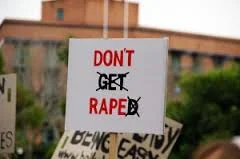This Is What A Feminist Looks Like
/Looking back on International Women’s Week
Women’s week at StFX has come to end after a week of laughter, tears and solidarity and what a beautiful week it’s been to say in the least.
I wish that I could have attended every single event that was put off this week, but alas it’s paper season in my fourth year and it’s not being too kind to me.
I started off the week by attending the screening of Dolores. Dolores centers on Dolores Huerta’s committed work to organize California farmworkers to form the UFW, in alliance with the Chicano Movement, the Civil Rights Movement, Gay liberation and US-based LGBTQ+ social movements, and the late 20th century women’s rights movement.
I have to say I am ashamed that I did not know who Huerta was before I watched this documentary. Huerta is a powerhouse of a woman and I can easily see that I have fallen in love with this woman. She stood up to sexist remarks that were snarled at her and found her way in a male dominated society. She changed the future for many Chicano farmworkers, improving their work conditions, and making them know that their concerns and voices are valid and heard.
If you ever come across this documentary and have the chance to watch it, I encourage you to do so, you’ll also find yourself blinded by Huerta’s brilliance.
Then on Wednesday, March 6, I attended the Learning Lodge: Honouring Indigenous Women, which was a very powerful night. The panel consisted of Shane Bernard, Karen Bernard, Jennifer Cox, Devann Sylvester and Kaysha Young. Each of the panelists shared their own personal stories of what it means to them when it comes to honouring indigenous women and how we can continue to honour these women. Everyone brought something so unique and special, the audience held onto every word that was spoken. It was a privilege to be able to hear these their powerful voices.
Friday, March 8, marked international women’s day around the world and one of the celebrations that took place on this campus was a women’s march. It started off on the steps outside of the Coady International Institute, the honour song was sung out in the cold air by two Mi’kmaq women but their voices warmed the souls of everyone there.
Rebecca Mesay and Naima Chowdhury also offered words of solidary before the rally began. The group took the streets of Antigonish cheering and chanting about women’s rights and the need for improvement. It was hopeful and encouraging when people in their cars would honk their horns and smile at us.
Yet, something strange happened. When were out in the community of Antigonish I felt free, and a sense of safety and support from the rest of the community. The minute we stepped back onto campus I felt myself being scared, scared to cheer and I could feel the eyes of students passing us burning into my back.
And, it made me angry. I’m proud to be a feminist, I’m proud of my loud voice and I’m proud of standing up to injustices when I see them. And somehow, I find myself being afraid to be who I am on this campus.
Being a feminist on this campus is like walking around with a huge target on your back and it’s hard to ignore the stares, the judgment and the whispers.
But I won’t let the judgement of others hold me back, rather I’ll let it fuel me to keep on fighting the good fight. This was the last women’s week I’ll get to experience at StFX and it exceeded all my expectations.






